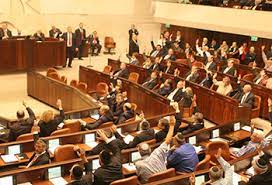Should Supreme Court Judges be elected instead of appointed?
Should Judicial Pronouncements be subject to Knesset approval?
The Supreme Court’s main purpose is to interpret the law and defend the Constitution. It must assure that laws follow the Constitution.
The Supreme Court in the U.S.
In the most democratic republic, the US, the court’s main purpose is to interpret laws passed by the legislature, to defend them, and adhere to the Constitution which is the foundational governing document of the country, adopted and amended by “We the People.” Supreme Court Justices may hold their position as long as they choose unless the Senate impeaches them. Anything else is a usurpation (the act of taking control of something without having the right to do so, especially of a position of power.)
The US Supreme Court functioned as an antidemocratic institution when it declined to enforce federal laws because the unelected judges disagreed with Congress about whether they are constitutionally appropriate.
While President Lincoln was in office, the court decided that Congress had no power to restrict the spread of slavery. President Lincoln gave reasons why Congress, and not the Supreme Court, should have the final word on what the Constitution requires. He stated:
“The candid citizen must confess that if government policy upon vital questions affecting the whole people is to be irrevocably fixed by the Supreme Court,” the people will have ceased to be their own rulers, having to that extent practically resigned their government into the hands of that eminent tribunal.”
Lincoln was in essence saying that a self-governing people (elected by the majority of the citizens) should have the power to determine what their fundamental law meant.
Lincoln’s argument wasn’t that the Constitution shouldn’t be enforced, but that democratically, Congress was the best institution to enforce it. If people or state governments disagree about a law’s constitutionality, they can campaign to repeal that law. Even the number of Supreme Court Justices is left to Congress. Currently, there are nine justices in the US Supreme Court.
However, if the Supreme Court decides not to enforce a federal law, the majority of justices actually declare that their view is superior to everyone else’s. Even if the president, more than 500 members of Congress, and the four other justices interpret the Constitution as permitting a law, if five justices disagree, then the law is not enforced.
The Supreme Court In Israel
In Israel in the last three decades, the left lost the elections except for the last government that was formed with a minority of voters since the right-wing parties, headed by the largest party, Likud, was shy of one Knesset Member in order to form a coalition.

About 25 years ago, the Supreme Court headed by leftist judge Aaron Barak gradually took control over government policies and Knesset legislation by doing exactly what President Lincoln was against. Israel is the only country in the world where the Supreme Court makes laws without a conscious decision by the government legislative authority.
There is now an absurd situation where the government is restricted from expressing its position, which represents the majority of its citizens since it is bound by the non-elected few legal advisers. The notion that a group of judges protects democracy better than legislators has no basis, nor should there be a difference between the rule of law and the rule of judges, which is now the case in Israel.
Through the years, the attorney general, government legal advisors, and the Supreme Court have managed to block successive Likud governments from advancing their policies across a great number of issues. They gave themselves the authority, binding decisions to overturn any government decision and law, which is unreasonable in their opinion.
The new Justice Minister Yariv Levin has proposed a series of changes aimed at curbing the powers of the judiciary, including allowing lawmakers to pass laws that the High Court of Justice has struck down.

The suggested reforms in the judicial system will first of all further politicize the process for electing judges, giving the government control of appointments, the government’s involvement in the election of the High Court’s Chief Justice; thus allowing the government to create a new position of State Prosecutor.
Now, with Justice Minister Yariv Levin’s judicial and legal reform plan representing the first real threat to their grip on power, the judicial system and its supporters in the media and the far left are threatening to overthrow the government.
Levin has proposed a law that would empower the country’s 120-seat Knesset to override Supreme Court decisions with a simple majority of 61 votes. Levin also proposes giving the government control of appointments, and the government’s involvement in the election of the High Court’s Chief Justice, making it more difficult for the Supreme Court to abolish bills and allowing the Knesset to overturn such rulings; bar the Supreme Court from intervening on Basic Laws and with a majority of 61 Knesset members, allow the Knesset to re-legislate laws the court does manage to annul. Legal advisors to public ministries will be appointed by the ministers, and absolve ministers of the requirement to abide by their legal advisors’ guidance, weakening the position of the legal advisor to the government.
Levin plans to restore power that was grabbed by overly intervening judges back to elected officials.
Another critical limitation on the court that is necessary by the reformation is removing the court’s ability to use the clause of “reasonableness” which is not actually a law but decisions that are “reasonable” in the judge’s opinion, which they have used for years to abolish important government and local authorities decisions. Because “reasonableness” is based on opinions and not actual laws, the new government opposes it and proposes to change it.
“We go to the polls, vote, elect, and time after time, people we didn’t elect choose for us… that is not democracy,” Levin said last week when outlining the major components of his reforms during a press conference in the Knesset. These reforms will strengthen the legal system, and restore the public’s trust in it. They will restore order: It will allow the legislatures to legislate, the government to govern, legal advisers to advise, and judges to judge.”
The leftists fear that the government will have ultimate power that it will use not only against LGBTQ rights and illegal immigrants but also in elections and free speech and anything it wants. These fears are unfounded since the government is bound by the existing Basic Laws.
